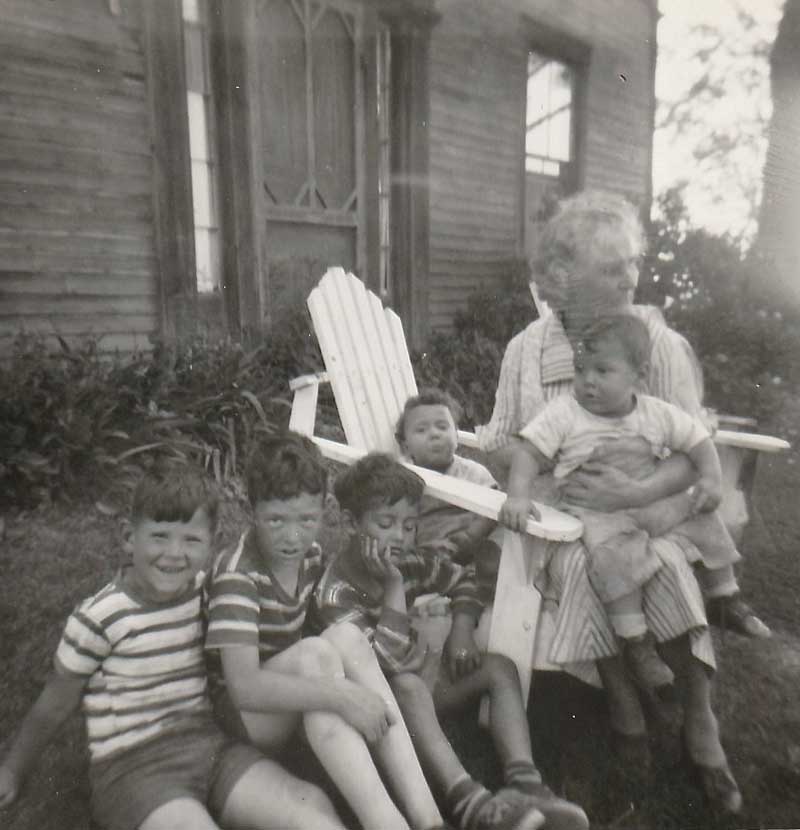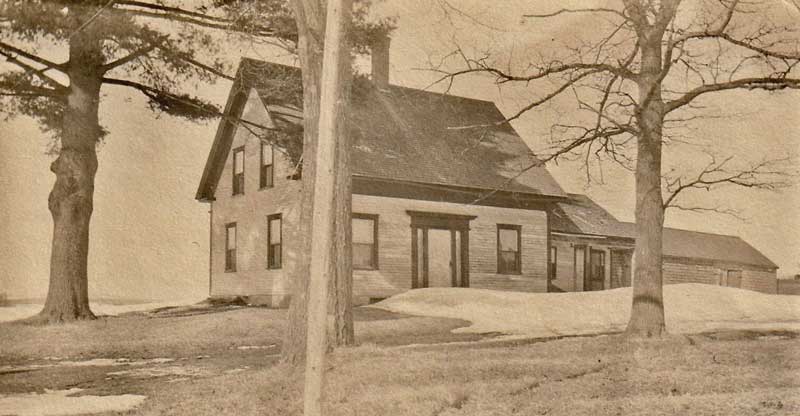 Pepe became a member of the Yeaton and Heald families in 1958 after his mother and siblings were killed by a hay truck. He had the disposition of a loving house cat. Photo by Paul Cyr
Pepe became a member of the Yeaton and Heald families in 1958 after his mother and siblings were killed by a hay truck. He had the disposition of a loving house cat. Photo by Paul Cyr
One morning in early June 1958, the skunk stench was so overpowering in my grandparents’ barn, we wore wet handkerchiefs over our noses and mouths while milking the cows at dawn. The odor, unbearable in the kitchen too, ruined our breakfast appetites. My twin brother, Don, and I, then age 6, were determined to get rid of the skunk, which my grandparents correctly predicted had been hit by a vehicle near our farmhouse.
Growing up on a dairy farm, Don and I had seen stillborn calves and lambs. Death is part and parcel of farm life. But the scene of the road-killed mother skunk was unlike anything our young eyes had ever witnessed. Her lone surviving kit cried in a feeble attempt to nurse on its dead mother. Reporting our discovery to Grammy, she immediately phoned Ada and Dick Heald, our farming neighbors.
The couple, self-designated wildlife rehabilitators, had a big barn and bigger hearts. Mrs. Heald rescued the skunk kitten, while her husband buried its mother and siblings. She neutralized the repulsive odor by bathing the baby skunk in a galvanized tub of peroxide, dish soap, tomato juice, baking soda, and vinegar. Once clean and towel dried, the Healds named him Pepe, in honor of the lovable Looney Tunes cartoon character Pepé Le Pew. She told Grammy, “Pepe takes to bottled goats’ milk like a bear takes to honey.” Too young to survive independently, he quickly became a Heald family member.
 The author is seated in the Adirondack chair in 1953 with Grammy Yeaton holding twin brother Don. The author’s older cousins are seated on the lawn. Photo courtesy Ron Joseph
The author is seated in the Adirondack chair in 1953 with Grammy Yeaton holding twin brother Don. The author’s older cousins are seated on the lawn. Photo courtesy Ron Joseph
By mid-July, after fully recovering from the surgical removal of his two scent glands, Pepe regularly visited our farm at 6:15 a.m., which coincided with the hour that Grandpa, Don, and I arrived in the kitchen following barn chores. We often ate hot buttermilk biscuits smothered with molasses or Grammy’s grape jelly, along with thick bacon strips and fluffy omelets baked in a cast iron skillet in the wood cookstove’s oven. Pepe ate with us, roaming between chairs to accept handouts. Oatmeal was the only breakfast food he rejected, which further endeared him to Don and me because we didn’t like it either.
When Pepe struggled to step onto the porch—Mother claimed he was overweight—Don and I took turns carrying him into the kitchen. He was gentle and cuddly as a well-behaved house cat, and we grew to love him as much as the Healds did. Chicken eggs were his favorites. He also relished the seasonal treat of snapping turtle eggs we unearthed from the river’s warm, sandy banks. After meals, Pepe would roll on his back and remain motionless—a signal that he wanted his throat and belly combed with a dog brush. We obliged, causing him to close his eyes, purr, and utter soft guttural sounds like the ones Grandpa made dozing in his La-Z-Boy.
Even my dour, cold Yankee grandmother took a liking to him, though she would only grudgingly admit it. It would take a colder heart than hers not to melt when Pepe wrinkled his nose and whiskers or slowly blinked his near-sighted dark eyes. Had he been her child, Mother mused aloud, he would have been fitted with eyeglasses. He quickly learned, though, that the barn was off-limits. The one time he stepped into it, our border collie’s growl and the barn cats’ hisses sent Pepe scurrying. Even the horses and cows protested his presence by stomping their hooves and vocalizing. He shrugged off the rejections and trundled off to dig for grubs in a patch of jewelweed next to the woodshed.
 Grampa Yeaton with his two Belgian workhorses, Prince and Colonel, in a 1935 photo. The author’s aunt, Maxine, is seated on Prince. The icehouse, Pepe’s favorite summer hangout, is to the right of the horses. Photo courtesy Ron Joseph
Grampa Yeaton with his two Belgian workhorses, Prince and Colonel, in a 1935 photo. The author’s aunt, Maxine, is seated on Prince. The icehouse, Pepe’s favorite summer hangout, is to the right of the horses. Photo courtesy Ron Joseph
When he dallied going home, Mrs. Heald would phone Grammy to inquire about Pepe’s whereabouts. “He just crossed from our pasture into yours,” Grammy would reassure her. Or she’d say, “Pepe is napping on a wool blanket behind the wood cookstove. He’ll be home by and by.”
Fearful that he’d be hit by a vehicle, the Healds erected a simple hand-painted, wooden roadside sign: “Caution: Pepe’s Crossing.” Everyone in town knew him.
Once, when Edwina Brewster—a mean old spinster—arrived at our farm to purchase Grammy’s hand-churned butter and a half-dozen eggs, Don and I played a trick on her. Minus the hat and broom, she was the spitting image of the Wicked Witch of the West. As she opened the self-service oak ice box at the end of driveway, we lowered Pepe to the ground behind her and then quietly hid in front of her car. She turned, saw Pepe, screamed, and dropped the eggs. When told of the prank during supper, Grandpa laughed but Grammy did not. Although Mrs. Brewster was “a nosy old busybody,” according to Grammy, she scolded us. Concerned that the incident would harm her egg and butter business, she phoned Bea, the Ma Bell operator, and asked that she spread the word that Pepe was de-scented and that “the boys’ silly prank wouldn’t be repeated.”
When Pepe was 2 years old, neighbors were on high alert when he disappeared for several days. Herman Redlevske paused the harvest of his final crop of hay to join the search for Pepe and found him barely alive in an abandoned well. Mr. Redlevske extracted the sopping skunk with a jury-rigged extension pole attached to a salmon net. But a day later, Pepe died in a dog bed in the Healds’ kitchen. My 8-year-old mind reasoned that Pepe had clung to life in the well long enough to say goodbye to his adopted family.
Several neighbors gathered for the funeral in the Healds’ woodlot. To honor him, my brother and I wore our favorite cowboy shirts and bolo ties. Grammy, who held a grudge like no other, boycotted the funeral. A week before he tumbled into the well, Pepe had poked his head in the henhouse, which upset the chickens and my grandmother.
“Two of my best laying hens were so traumatized, they haven’t laid an egg in two days,” she bitterly complained.
As soon as the last shovel of soil covered Pepe’s grave, Mother, who knew the names of every woodland plant, said it would be fitting to transplant several Stinking Benjamins from Grandpa’s woodlot to Pepe’s grave, which we did.
 The author’s grandparents, Lucille and Florian Yeaton, moved into the farm the day after their wedding in 1917. The house was built by Florian’s grandfather in 1823. Photo courtesy Ron Joseph
The author’s grandparents, Lucille and Florian Yeaton, moved into the farm the day after their wedding in 1917. The house was built by Florian’s grandfather in 1823. Photo courtesy Ron Joseph
During supper that night our family took turns telling Pepe stories. Don and I recalled how each time we picked Pepe up, he would fart. Mother quipped, “Without scent glands, his weakened defense system operated on fumes.” Grampa, who was a horse-whisperer before the term was invented, capitalized on the flatulence discussion by sharing words of wisdom: “A farting horse never tires; a farting man is the man to hire.”
Grammy, though, had had enough of the flatulent talk and shooed us out of the kitchen. Playing checkers with Grandpa in the parlor, we overheard Grammy chuckling to herself while she and Mother washed and dried dishes. She then shared a story of the summer morning Pepe had pushed open the screen door and entered the kitchen dragging a long strip of toilet paper stuck on his hind paw. Washing all four paws with soapy water, she had admonished him for wandering behind the barn where the chamber pots were emptied. (My grandparents’ farmhouse had no indoor plumbing until 1972.)
To this day, the memory of Grammy’s Pepe story makes me laugh like an 8-year-old boy.
✮
Ronald Joseph is the author of Bald Eagles, Bear Cubs, and Hermit Bill: Memories of a Maine Wildlife Biologist.






